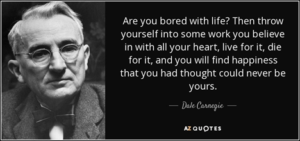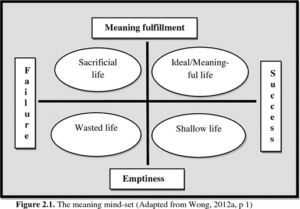
Employee engagement (Harter, 2021) and wellbeing (Bersin, 2022) remain the hottest topics during the post-pandemic era. The great resignation, “quiet quitting” (Harter, 2022), and the resistance to return to the office (Cutter & Bindley, 2022; Guilford & Overberg, 2022) are troublesome trends that adversely impact productivity, the economy, and wellbeing.
Common sense attributes these developments to pandemic fatigue or mental health issues due to the perfect storm of converging problems from COVID-19, Russia’s invasion of Ukraine, a poor economy, and climate changes
However, I propose that it is possible for some people, all these existential crises may trigger a new awakening with gigantic positive potentials, with the following implications (Wong, Mayer, & Arslan, 2021):
- We may be moving beyond success and happiness in search for something more fulfilling and spiritual (Wong, 2021).
- The days of the carrot and stick as motivators for employee engagement may no longer be sufficient as we are now moving towards what is intrinsically motivating.
In his book Blind Spot: The Global Rise of Unhappiness and How Leaders Missed It, Jon Clifton (2022) believes that the two major motivators are good pay with benefits and the emotion of being treated well and cared for.
But the human cravings for personal gains, recognition, and attention can never be fully satisfied, because of our insatiable greediness and inherent human limitations. That is why these two positive incentives are not enough to move the needle significantly toward greater engagement and wellbeing.
In addition, money and a pleasant work environment are not enough to increase engagement over the long haul, unless workers learn to accept and cope with the fact that work stress, and bad bosses and colleagues is inevitable.
In short, we need a stronger intrinsic motivator, which must come from the depth of one’s heart and soul. It begins with the awakening to one’s sense of personal responsibility for some fundamental changes in one’s life.
It boils down to meaning or self-transcendence as the ultimate answer to employee engagement. The opening quote from Carnegie says it well: we need to find something worth sacrificing and dying for, and we need a vision large enough that can set our soul on fire.
A Reorientation Towards Work and Towards Life
Frankl (1946/1985) makes a similar point and calls for a re-orientation from self-centeredness towards self-transcendence.

This calls for a reorientation from the success orientation towards a meaning orientation and from carnal cravings to the spiritual yearning for meaning, connections, and love as illustrated by the following graph:

This re-orientation begins with enlightenment: the awakening of spiritual awareness of one’s boredom and dissatisfaction with life and the need for some fundamental change. This is what the lockdown and isolation during COVID 19 can do for us–it awakens us from the emptiness and futility of our superficial, materialistic way of existence and helps us embark on a spiritual journey to find a meaningful and satisfying way of existence.
Meaning and Spirituality at the Workplace
Crowley’s (2022a) Lead from the Heart also affirms my belief that spirituality exists in every human being and the world can become a better place if we are all awakened to our deep-seated spiritual yearning for faith, hope, and love.
When one’s soul is on fire, the energy of soul power is undefeatable because it is based on a connection with the power source or God. Faith or belief in something of value has the power to inspire people to aim higher and run further. The greatest human achievements in every domain are never motivated by the pursuit of wealth and fame, but by the capacity for self-sacrifice and enduring hardship and suffering to fulfill the highest ideals (Wong & Worth, 2017).
I propose that the soul is the source of existential and spiritual intelligence, or wisdom of the soul (McLaughlin & McMinn, 2022; Wong, 2022). It is the intelligence that guides us to best engage with life in order to live and die well, or how to successfully meet our ultimate concerns and spiritual needs for self-transcendence and oneness with a Higher power or nature.
During the post-pandemic era, more and more people are asking the same questions: Does my life matter? What is the meaning of working and striving, when the future is so uncertain, and death can come anytime? The era of COVID-19 has motivated more people to search for meaning and self-transcendence (Wong et al., 2021).
The corona generation–those who are ready to enter the workplace during the pandemic (2020 – 2022), having gone through mandatory lockdowns and the disruptions of education and normal routines–they may be more aware of the existential crisis and the fragility and briefness of life. They are desperately searching for answers to their existential questions, which requires the quest for meaning and the cultivation of existential-spiritual intelligence.
The soul cries out for meaning, spirituality, and morality. The soul is primarily the seat of our conscience, transcendental values, and our deep-seated spiritual yearning for meaning. The soul yearns to be connected with people and oneness with something much bigger and higher than we are.
The soul wants to do the right thing, but the heart wants to do what is fun or enjoyable. The soul has the courage to pursue the highest ideals of truth, goodness, and beauty, but the heart wants safety and comfort.
The soul wants to forgive and love one’s enemies, the heart wants to be with people who make us feel happy. The soul wants nurturing from reading sacred writings, prayer and meditation, or spending time alone with nature or God; the heart wants to feel warm and fuzzy happy feelings. We need to restore the soul to our workplace.
I have written extensively on how to lead from the soul and spiritual principles. Here is what I wrote in 2003 about spirituality and meaning at work (Wong, 2003):
Here are some of the attributes of spirituality within the context of work:
- Defining ourselves as having inherent values, greater than our roles, titles and possessions
- Affirming meaning and purpose in spite of absurdity and chaos
- Emphasizing authenticity, inner wisdom, creativity, and transformation
- Recognizing the immaterial, transcendental, and sacred dimensions of reality
- Having a servant’s attitude towards work and leadership
- Embodying spiritual values of integrity, honesty, love, kindness, and respect
- Emphasizing social responsibility toward the community, society, and environment
- Viewing God and spiritual principles as the ground for moral decisions
Matthew Fox (1995) also emphasizes the importance of revitalizing our joy in work by considering work as a spiritual expression of the soul.
Clifton’s (2022) book Blind Spot shows statistically that most people are totally miserable at work and concludes that we need to create better jobs. But I argue that it is more important to educate people to reimagine work as a spiritual calling.
What does Meaningful Work Look Like?
Wong and colleagues’ (2016) chapter defines meaningful work as being good at three levels: individual, organization, and society.
At the individual level, good work means that employees are empowered to make the optimal use of their strengths to fulfill their dreams, resulting in a high level of job satisfaction and productivity.
At the organizational level, both management and employees work together to contribute to a positive culture of collaboration (Schuman, 2006; Wong, 2006).
At the societal level, good organizations assume their social responsibilities to contribute to the greater good beyond the bottom line. This vision for the common good is embraced at every level of the organization. Thus, a good organization is not only a good place to work for, but also an agent of positive social change.
Meaningful work requires a shift in attitude and motivation from self-centeredness to the self-transcendence of serving a higher purpose and greater good. With the intrinsic motivation of serving a cause greater than oneself and with an appreciative attitude, even mundane or low-paying work can become meaningful.
Since a large part of adult life is work, it follows that the meaning of work and meaning of life are inextricably connected. This natural connection between meaningful work and meaning in life has not been widely recognized. My meaning hypothesis posits that when we value and pursue what really matters in life and what is intrinsically worthwhile, we will experience authentic happiness.
This meaning hypothesis extends Frankl’s (1946/1985) logotherapy to the workplace. It posits that every person is unique and has intrinsic value, but it also recognizes the dark side of human nature – greed, pride, prejudice, egotism, and the capacity for evil. Wong (2011) proposes that “a balanced model of Positive Psychology explicitly seeks to harness the positive potentials from negative emotions and situations for both individuals and society.”
Thus, the meaning-centered approach to good work is capable of balancing the bright and dark sides of human nature and cultivates the spiritual yearning for meaning, connectiveness, and ethics.
Conclusion
Tiffani Bova (2018), in her recent bestselling book Growth IQ: Get Smarter About the Choices that will Make or Break Your Business, points out that research proves that there is a direct causal relationship between employee satisfaction and company revenues (Crowley, 2022b). Yes, it pays to put people first and increase job satisfaction. But the most important and least researched area is how to help employees make full use of the power of meaning and purpose in their work and their lives.
Ultimate engagement simply means moving beyond egotistic interest, beyond the material world, towards the spiritual realm of willing to make the ultimate sacrifice for a worthy life goal. Full engagement in meaningful work can be expressed in any of the following ways:
- Developing one’s full potential to make a difference in the world.
- Doing one’s utmost as if for God rather than for people.
- Improving one’s performance daily and enjoying the intrinsic satisfaction from the progress.
- Speaking the truth in love as a way to develop genuine relationships at work.
- Helping each other succeed, thus contributing to an enjoyable collaborative culture.
- Accepting both the positive and negative aspects of work with gratitude.
- Considering the workplace as a school of hard knocks, teaching us the necessary virtues and wisdom of how to survive and thrive.
- Learning to turn every Hell into Heaven through faith and meaning transformation.
In sum, when one is motivated by serving something greater than oneself with all one’s heart, mind and soul, one may achieve the ultimate engagement and job satisfaction.
References
- Bersin, J. (2022, August 29). Mental health has become a business imperative. MIT Sloan Management Review. https://sloanreview.mit.edu/article/mental-health-has-become-a-business-imperative/
- Bova, T. (2018). Growth IQ: Get smarter about the choices that will make or break your business. Portfolio.
- Clifton, J. (2022). Blind spot: The global rise of unhappiness and how leaders missed it. Gallup Press.
- Crowley M. C. (2022a). Lead from the heart: Transformational leadership for the 21st century. Hay House Business.
- Crowley, M. C. (2022b, September 1). Tiffani Bova: Salesforce’s growth guru explains why employees must come first. Mark C. Crowley. https://markccrowley.com/tiffani-bova-salesforces-growth-guru-explains-why-employees-must-come-first/
- Cutter, C., & Bindley, K. (2022, September 3). Enough, bosses say: This fall, it really is time to get back to the office. The Wall Street Journal. https://www.wsj.com/articles/back-to-the-office-hybrid-work-remote-labor-day-11662151436
- Fox, M. (1995). The reinvention of work: A new vision of livelihood for our time. Harper San Francisco.
- Frankl, V. E. (1985). Man’s search for meaning. Washington Square Press. (First published in 1946)
- Guilford, G., & Overberg, P. (2022, September 15). New data show broad shift to remote work during pandemic. The Wall Street Journal. https://www.wsj.com/articles/new-data-show-broad-shift-to-remote-work-during-pandemic-11663214461
- Harter, J. (2021, July 29). U.S. employee engagement data hold steady in first half of 2021. Gallup. https://www.gallup.com/workplace/352949/employee-engagement-holds-steady-first-half-2021.aspx
- Harter, J. (2022, September 6). Is quiet quitting real? Gallup. https://www.gallup.com/workplace/398306/quiet-quitting-real.aspx
- McLaughlin, P. T., & McMinn, M. R. (2022). A time for wisdom: Knowledge, detachment, tranquility, transcendence. Templeton Press.
- Schuman, S. (Ed.) (2006). Creating a culture of collaboration: The international association of facilitators handbook. John Wiley & Sons.
- Wong, P. T. P. (2003). Spirituality and meaning at work. Positive Living Newsletter. https://www.meaning.ca/article/spirituality-and-meaning-at-work/
- Wong, P. T. P. (2006). Is your organization an obstacle course or a relay team? A meaning-centered approach to creating a collaborative culture. In S. Schuman (Ed.), Creating a culture of collaboration: The international association of facilitators handbook (pp. 229–256). Jossey-Bass/Wiley.
- Wong, P. T. P. (2011). Positive psychology 2.0: Towards a balanced interactive model of the good life. Canadian Psychology/Psychologie canadienne, 52(2), 69–81. https://doi.org/10.1037/a0022511
- Wong, P. T. P. (2021, August 6-8). Beyond happiness and success: The new science of self-transcendence [Conference session]. International Network on Personal Meaning 11th Biennial International Meaning Conference, Toronto, ON, Canada.
- Wong, P. T. P. (2022). The wisdom of the soul: The missing key to happiness and positive mental health? [Review of the book A Time for Wisdom: Knowledge, Detachment, Tranquility, Transcendence, by P. T. McLaughlin & M. R. McMinn]. International Journal of Existential Positive Psychology, 11(1). https://www.meaning.ca/ijepp-article/vol11-no2/the-wisdom-of-the-soul-the-missing-key-to-happiness-and-positive-mental-health/
- Wong, P. T. P., & Worth, P. (2017). The deep-and-wide hypothesis in giftedness and creativity [Special issue]. Psychology and Education, 54(3/4). http://www.psychologyandeducation.net/pae/category/volume-54-no-3-4-2017/
- Wong, P. T. P., Ivtzan, I., & Lomas, T. (2016). Good work: A meaning-centred approach. In L. G. Oades, M. F. Steger, A. Delle Fave, & J. Passmore (Eds.), The Wiley Blackwell handbook of the psychology of positivity and strengths-based approaches at work (pp. 233–247). Wiley Blackwell. (Partially supported by the research grant on Virtue, Happiness, and the Meaning of Life from the John Templeton Foundation)
- Wong, P. T. P., Mayer, C.-H., & Arslan, G. (Eds.). (2021). COVID-19 and existential positive psychology (PP 2.0): The new science of self-transcendence [Special Issue]. Frontiers. https://www.frontiersin.org/research-topics/14988/covid-19-and-existential-positive-psychology-pp20-the-new-science-of-self-transcendence
Cite
Wong, P. T. P. (2022). Ultimate employee engagement and wellbeing [President’s Column]. Positive Living Newsletter. http://www.drpaulwong.com/ultimate-employee-engagement-and-wellbeing/

 Meaning Conference 2025 will be the INPM’s first in-person conference with a virtual option after the pandemic.
Meaning Conference 2025 will be the INPM’s first in-person conference with a virtual option after the pandemic.